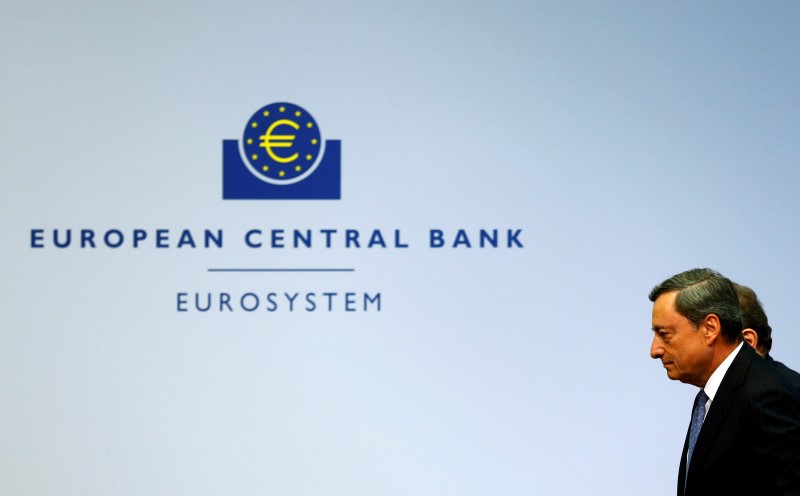By John Geddie
LONDON (Reuters) – Investors bought up longer-dated euro zone debt on Friday, expecting the European Central Bank to focus its bond purchases on higher-yielding paper as it faces a shortage of eligible assets for its stimulus scheme. Around a third of euro zone government bonds and over half of German debt is out of reach of quantitative easing, private estimates show, because it yields less than the ECB’s deposit rate, the lower limit the central bank has set for its purchase program. ECB chief Mario Draghi said on Thursday that technicalities would not stand in the way of the asset buys and that the bank would reassess policy after fresh economic projections in September.
Long-dated yields, which move inversely to prices, were slightly lower on the day as data suggested some of the bloc’s economies were feeling the effects of Britain’s vote to leave the EU last month. Shorter yields, on the other hand, rose. Germany’s benchmark 30-year yield fell 2 basis to 0.51 percent “The central bank will buy longer-dated bonds because they are the only ones left eligible,” Mizuho strategist Antoine Bouvet said. “This should continue at least until the September meeting when (the bank is) …expected to propose a new solution.” A rush for safe-haven debt following Britain’s shock vote to leave the EU in June ramped up speculation that the ECB would need to tweak its scheme, although yields have moved off record lows hit following the referendum. Asked if Brexit could further narrow the pool of bond options for the ECB, Bundesbank President Jens Weidmann told Reuters that it may discuss after its summer break reviewing the conditions for bond purchases. ZERO 30-YEAR YIELD?
Analysts polled by Reuters expect changes including purchases of bonds yielding less than the deposit rate and an increase of the 33 percent purchase limit on individual bonds.
There has been talk the ECB could make bigger changes such as a shift to buying bonds in proportion to a country’s debt rather than the size of its economy, though bank estimates suggest this would only add five to eight weeks to a scheme some predict will hit the buffers within months. Aside from the technical aspects, any perceived delays to monetary easing could depress future inflation, which traders say is making investors look at “curve flattening” trades where they buy a higher share of long-dated bonds. A key market measure of long-term inflation expectations in the euro zone — the five-year, five-year forward rate — stands just above record lows at 1.33 percent Unless the ECB takes action to address bond scarcity, analysts say the pressure on long-dated bonds could see 30-year German yields head towards zero percent.
Those yields have tumbled 21 bps since the Brexit vote, notching up more falls than in any other maturity.
“The sheer weight of the ECB’s presence could push 30-year bond yields to zero,” said Rabbani Wahhab, a senior fixed income portfolio manager at London and Capital.
(Additional reporting by Dhara Ranasinghe; Editing by Patrick Graham and John Stonestreet)
Investors shift into longer debt as ECB ducks scarcity issue

By John Geddie













